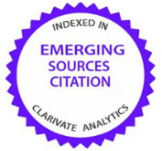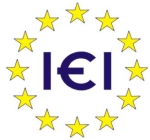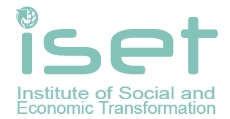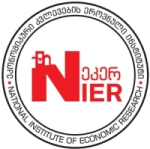Contemporary Higher Accounting Education for Social Responsibility
Abstract
Introduction. Nowadays participants in the business and social life face challenges in the context of the sustainability and the social responsibility. The only way to successfully overcome them is by all of them working together in one direction at all levels and in all fields. All efforts to harmoniously achieve the goals of sustainable development by the various communities of the planet are extremely relevant today and will continue in the future. Higher accounting and economic education are in support of sustainability, management of natural resources and social responsibility.
Aim and tasks. The aim of the research is to analyze the possibilities for further development of economic solutions in the context of application integration approaches with care for our unique planet and its riches for the future. The tasks of the research find expression in: 1) to prove the need to pay attention to the issues of sustainable development when making decisions about the economy; 2) to analyze the essence and principles of an up-to-date concept for a sustainable way of doing business and management of natural resources; 3) to indicate the path that business and society shall take in order to develop responsibly; 4) to prove the importance of developing an international and national strategy for corporate social responsibility.
Results. The data shows that today it is required that the specialist with a higher economic and accounting degree possess knowledge and competences for the quality realization of reporting, controlling, and other activities in the private and public sectors. Specifically, the investments in new knowledge and competences of such specialists in the context of sustainability, management of natural resources, and social responsibility create prerequisites for a more competitive and resilient business. At the same time, the data shows that the degree of balance between the three aspects (social, economic, and environmental) and the whole direction of higher education towards the problems of sustainable development as of this moment is not satisfactory.
Conclusions. The dominant idea is that successful implementation of flexible educational schemes, accelerated digital transformation, and full adaptation to relevant business challenges (the practice) will result in the establishment of a new model of educational policy that will contribute to the successful realization of sustainability, natural resource management, and social responsibility.
References
Brundtland, G.H. (1987) Our Common Future: Report of the World Commission on Environment and Development. Geneva, UN-Document A/42/427.
Calder, W., & Clugston, R. (2005). Editorial: Education for a Sustainable Future. Journal of Geography in Higher Education, 29(1), 7–12. https://doi.org/10.1080/03098260500030231
Elkington, J. (1997). Cannibals With Forks: The Triple Bottom Line of 21st Century Business. Oxford: Capstone Publishing Limited.
Fleischman, R. K., & Schuele, K. (2006). Green accounting: A primer. Journal of Accounting Education, 24(1), 35-66. https://doi.org/10.1016/j.jaccedu.2006.04.001
Gray, R. (1992). Accounting and environmentalism: An exploration of the challenge of gently accounting for accountability, transparency and sustainability. Accounting, Organizations and Society, 17(5), 399-425. https://doi.org/10.1016/0361-3682(92)90038-t
Gray, R. (2010). Is accounting for sustainability actually accounting for sustainability…and how would we know? An exploration of narratives of organisations and the planet. Accounting, Organizations and Society, 35(1), 47–62. https://doi.org/10.1016/j.aos.2009.04.006
Gray, R., & Collison, D. (2002). Can't see the wood for the trees, can't see the trees for the numbers? Accounting education, sustainability and the Public Interest. Critical Perspectives on Accounting, 13(5-6). 797-836. https://doi.org/10.1006/cpac.2002.0554
GRI Standards (2021). https://www.globalreporting.org/standards/download-the-standards/
Hazelton, J., & Haigh, M. (2010). Incorporating Sustainability into Accounting Curricula: Lessons Learnt From an Action Research Study. Accounting Education, 19(1-2), 159–178. https://doi.org/10.1080/09639280802044451
Hutaibat, K. (2019). Incorporating practical sustainability and managerial and financial reporting in accounting education: An interactive project. Journal of International Education in Business, 12 (2), 181-197. https://doi.org/10.1108/JIEB-10-2018-0047
Jarmusevica, V., Ilisko, D., Badjanova, J., Jukss, V., & Petrova, M. (2019). Educating citizens for integrating the strategy of corporate social responsibility for sustainable regional development: the case study. Proceedings of EDULEARN19 Conference 1st-3rd July 2019, Palma, Mallorca, Spain, pp. 10449-10454, ISSN: 2340-1117, doi: 10.21125/edulearn.2019.2633
Koval, V., Polyezhayev, Y., & Bezkhlibna, A. (2018). Communicative competences in enhancing of regional competitiveness in the labour market. Baltic Journal of Economic Studies, 4(5), 105-113. https://doi.org/10.30525/2256-0742/2018-4-5-105-113
Kyrpychenko, O., Pushchyna, I., Kichuk, Y., Shevchenko, N., Luchaninova, O., & Koval, V. (2021). Communicative competence development in teaching professional discourse in educational establishments. International Journal of Modern Education and Computer Science, 13(4), 16–27.
Labunska, S., Petrova, M., & Prokopishyna, O. (2017). Asset and cost management for innovation activity, Economic Annals - XXI, 165(5-6), 13-18. https://doi.org/10.21003/ea.V165-03
Leal Filho, W., Frankenberger, F., Lange Salvia, A., Azeiteiro, U., Alves, F., Castro, P., Will, M., Platje, J., Orlovic Lovren, V., Brandli, L., Price, E., Doni, F., Mifsud, M., & Veiga Ávila, L. (2021). A framework for the implementation of the Sustainable Development Goals in university programmes. Journal of Cleaner Production, 299, 126915. https://doi.org/10.1016/j.jclepro.2021.126915
Linde, I., & Petrova, M. (2018). The challenges of formalization and modeling of Higher Education Institutions in the 21st century. CBU International conference proceedings 2018: Innovations in Science and Education, 21.-23.03.2018, 303-308, https://doi.org/10.12955/cbup.v6.1173
Lozano, R., Ceulemans, K., Alonso-Almeida, M., Huisingh, D., Lozano, F. J., Waas, T., Lambrechts, W., Lukman, R., & Hugé, J. (2015). A Review of Commitment and Implementation of Sustainable Development in Higher Education: Results from a Worldwide Survey. Journal of Cleaner Production, 108, 1-18. https://doi.org/10.1016/j.jclepro.2014.09.048
Maclagan, P., & Campbell, T. (2011). Focusing on individuals’ ethical judgement in corporate social responsibility curricula. Business Ethics: A European Review, 20(4), 392–404. https://doi.org/10.1111/j.1467-8608.2011.01634.x
Nikolova-Alexieva, V., Alexieva, I., Valeva, K., Petrova, M. (2022). Model of the Factors Affecting the Eco-Innovation Activity of Bulgarian Industrial Enterprises. Risks 2022, 10, 178. https://doi.org/10.3390/risks10090178
Petrova, M., Buzko, I., & Dyachenko, Yu. (2018). Cognitive, Intelligence Technologies and Economical Foundations of Teaching of International Economical Relations and Tourism. 17th International Scientific Conference Engineering for Rural Development. Jelgava, LATVIA, 1102-1106. https://doi.org/10.22616/erdev2018.17.n170
Rybalkin, O. (2022). Sustainable development goals progress in the European Union: correlation with EEPSE green economy index. Access to science, business, innovation in digital economy, 3(2), 121-135. https://doi.org/10.46656/access.2022.3.2(3)
Sisaye, S. (2011). Ecological systems approaches to sustainability and organizational development: Emerging trends in environmental and social accounting reporting systems. Leadership & Organization Development Journal, 32(4), 379-398. https://doi.org/10.1108/01437731111134652
Tormo-Carbó, G., Oltra, V., Seguí-Mas, E., & Klimkiewicz, K. (2016). How effective are business Ethics/CSR Courses in Higher Education?. Procedia Social and Behavioral Sciences, 228(7), 567-574. https://doi.org/10.1007/s10551-014-2455-6
Uteubayev, T., Petrova, M., & Lyubenova, I. (2018). Training of qualified specialists in the process of their education at the university: the role of the public-private partnership. CBU International conference proceedings 2018: Innovations in Science and Education, 491-495. https://doi.org/10.12955/cbup.v6.1203
Wynder, M., Wellner, K. U., & Reinhard, K. (2013). Rhetoric or Reality? Do Accounting Education and Experience Increase Weighting on Environmental Performance in a Balanced Scorecard? Accounting Education, 22(4), 366–381. https://doi.org/10.1080/09639284.2013.817802
Zagorodnya, A., Chernukha N., & Petrova, M. (2020). Contemporary trends of professional training specialists in the economic field at higher education institutions of Poland and Ukraine. Strategies for Policy in Science and Education, 28(3), 249-260.
If the article is accepted for publication in the journal «Economics. Ecology. Socium» the author must sign an agreementon transfer of copyright. The agreement is sent to the postal (original) or e-mail address (scanned copy) of the journal editions.






















